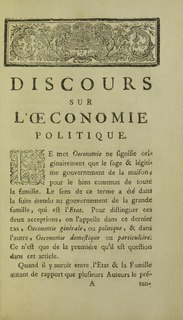
Political economy is the study of production and trade and their relations with law, custom and government; and with the distribution of national income and wealth. As a discipline, political economy originated in moral philosophy, in the 18th century, to explore the administration of states' wealth, with "political" signifying the Greek word polity and "economy" signifying the Greek word οἰκονομία. The earliest works of political economy are usually attributed to the British scholars Adam Smith, Thomas Malthus, and David Ricardo, although they were preceded by the work of the French physiocrats, such as François Quesnay (1694–1774) and Anne-Robert-Jacques Turgot (1727–1781). There is also a tradition which is almost as long, of critique of political economy.
This aims to be a complete article list of economics topics:
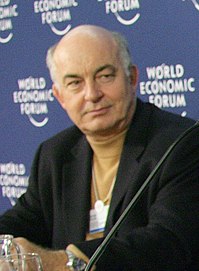
Kemal Derviş is a Turkish economist and politician, and former head of the United Nations Development Programme. He was honored by the government of Japan for having "contributed to mainstreaming Japan's development assistance policy through the United Nations". In 2005, he was ranked 67th in the Top 100 Public Intellectuals Poll conducted by Prospect and Foreign Policy magazines. He is Vice President and Director of the Global Economy and Development program at the Brookings Institution and part-time professor of international economics at the Graduate Institute of International and Development Studies in Geneva.

Jeffrey David Sachs is an American economist, academic, public policy analyst and former director of The Earth Institute at Columbia University, where he holds the title of University Professor. He is known as one of the world's leading experts on sustainable development, economic development, and the fight against poverty.
Social cost in neoclassical economics is the sum of the private costs resulting from a transaction and the costs imposed on the consumers as a consequence of being exposed to the transaction for which they are not compensated or charged. In other words, it is the sum of private and external costs. This might be applied to any number of economic problems: for example, social cost of carbon has been explored to better understand the costs of carbon emissions for proposed economic solutions such as a carbon tax.

Ross McKitrick is a Canadian economist specializing in environmental economics and policy analysis. He is a professor of economics at the University of Guelph, and a senior fellow of the Fraser Institute.

Nicholas Herbert Stern, Baron Stern of Brentford, is a British economist, banker, and academic. He is the IG Patel Professor of Economics and Government and Chair of the Grantham Research Institute on Climate Change and the Environment at the London School of Economics (LSE), and 2010 Professor of Collège de France. From 2013–2017, he was President of the British Academy and was elected Fellow of the Royal Society in 2014.
The Committee for Economic Development of Australia (CEDA) is a bipartisan, non-profit, national, independent, member-based organisation providing thought leadership and policy perspectives on the economic and social issues affecting Australia.
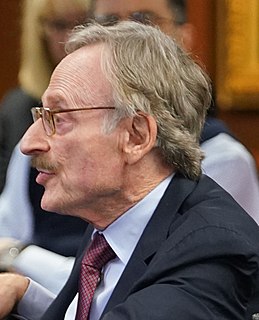
Michael Jay Boskin is the T. M. Friedman Professor of Economics and senior Fellow at Stanford University's Hoover Institution. He also is chief executive officer and president of Boskin & Co., an economic consulting company.

William Dawbney Nordhaus is an American economist, a Sterling Professor of Economics at Yale University, best known for his work in economic modeling and climate change, and one of the 2 recipients of the 2018 Nobel Memorial Prize in Economic Sciences. Nordhaus received the prize "for integrating climate change into long-run macroeconomic analysis".
Warwick James McKibbin is an Australian Professor of Economics at the Australian National University who works across a wide range of areas in applied policy. He has published more than 200 scholarly articles and several books and is internationally known for his contribution to global economic modelling.
Stephen W. Salant is an economist who has done extensive research in applied microeconomics. His 1975 model of speculative attacks in the gold market was adapted by Paul Krugman and others to explain speculative attacks in foreign exchange markets. Hundreds of journal articles and books on financial speculative attacks followed.
The Stern Review on the Economics of Climate Change is a 700-page report released for the Government of the United Kingdom on 30 October 2006 by economist Nicholas Stern, chair of the Grantham Research Institute on Climate Change and the Environment at the London School of Economics (LSE) and also chair of the Centre for Climate Change Economics and Policy (CCCEP) at Leeds University and LSE. The report discusses the effect of global warming on the world economy. Although not the first economic report on climate change, it is significant as the largest and most widely known and discussed report of its kind.
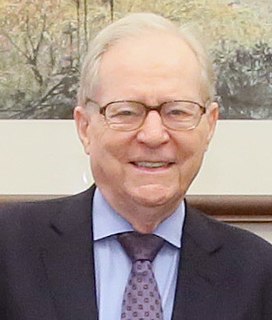
Dale Weldeau Jorgenson is the Samuel W. Morris University Professor at Harvard University, teaching in the Department of Economics and John F. Kennedy School of Government. He served as Chairman of the Department of Economics from 1994 to 1997.
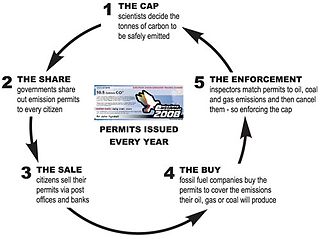
Cap and Share was originally developed by Feasta and is a regulatory and economic framework for controlling the use of fossil fuels in relation to climate stabilisation. Accepting that climate change is a global problem and that there is a need to cap and reduce greenhouse gas emissions globally, the philosophy of Cap and Share maintains that the earth’s atmosphere is a fundamental common resource. Consequently, it is argued, each individual should get an equal share of the benefits from the limited amount of fossil fuels that will have to be burned and their emissions released into the atmosphere in the period until the atmospheric concentration of greenhouse gases has been stabilised at a safe level.

Mark Kenneth Jaccard is a Canadian energy economist and author. He develops and applies models that assess sustainability policies for energy and material. Jaccard is a professor of sustainable energy in the School of Resource and Environmental Management (REM) at Simon Fraser University.
Integrated assessment modelling (IAM) or integrated modelling (IM) is a term used for a type of scientific modelling that tries to link main features of society and economy with the biosphere and atmosphere into one modelling framework. The goal of integrated assessment modelling is to accommodate informed policy-making, usually in the context of climate change though also in other areas of human and social development. While the detail and extent of integrated disciplines varies strongly per model, all climatic integrated assessment modelling includes economic processes as well as processes producing greenhouse gases. Other integrated assessment models also integrate other aspects of human development such as education, health, infrastructure, and governance.
Frank Jotzo is a Professor at the Australian National University's Crawford School of Public Policy, and Director of the Centre for Climate Economics and Policy at Australian National University. As an environmental economist, his research focuses on policy relevant aspects of climate change, energy, and broader issues of environment, development and economic reform.
Robert Bruce Litterman is chairman of the Risk Committee and a founding partner of Kepos Capital in New York. Prior to Kepos Capital, Litterman spent 23 years at Goldman Sachs, where he was head of the Quantitative Resources Group in Goldman Sachs Asset Management for 11 years, starting in 1998. Prior to that position, Litterman headed the firm-wide risk department from 1994 to 1998, and prior to that he was the co-head of the model development group in the research department of Goldman Sachs' Fixed Income Division. Litterman received a Ph.D. in Economics from the University of Minnesota in 1980.
Green recovery is a proposed package of environmental, regulatory and fiscal reforms to recover prosperity in the wake of the COVID-19 pandemic. Support has come from multiple political parties, governments, activists and academia across the European Union, the United Kingdom, the United States, and other countries. A key part of the package is to ensure that actions to combat recession also combat climate change, including the reduction of coal, oil, and gas use, clean transport, renewable energy, eco-friendly buildings, and sustainable corporate or financial practices. These initiatives are supported by the United Nations and the Organisation for Economic Co-operation and Development. In July 2021, the International Energy Agency warned that only around 2% of economic bailout money worldwide was going to clean energy. OECD data shows that only 17% of COVID-19 recovery investments funds had been allocated to a green recovery as of March 2021.









